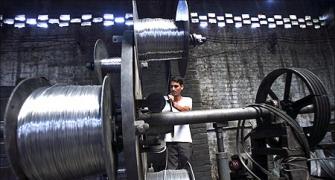The Commerce Ministry on Friday proposed revamp of the SEZ policy to address issues concerning land acquisition and boost exports with a view to bridge the widening trade deficit. In a draft discussion paper, the Ministry said that special economic zones (SEZs) could act as a potent instrument to increase the country's shipments and attract more foreign direct investment (FDI).
In a draft discussion paper, the Ministry said that special economic zones (SEZs) could act as a potent instrument to increase the country's shipments and attract more foreign direct investment (FDI).
"Given this scenario there is no option for India other than promoting enhanced exports and FDI growth. Given the very encouraging performance over the last five years, the SEZ programme is a promising instrument for achieving both these objectives," it said.
Proposing to review all land-related aspects of the SEZ policy, the discussion paper said that land availability for SEZs has become a constraint accentuated by fairly onerous requirements of minimum size, contiguity, pre-dominantly non-double cropped land and non-compulsory acquisition.
The Land Acquisition Act would possibly make the process of meeting land requirement even more challenging, it added.
"These factors call for a review of all land-related aspects of the SEZ policy so as to assess their underlying rationale and reasonableness," it said.
The paper said that there is a need to review aspects, like minimum area criteria for SEZs, vacancy and contiguity norms and processing/non-processing zone stipulations.
It further pointed out that in the present context, the companies are facing considerable difficulty in acquiring 1,000 hectare of contiguous land.
The paper proposed that the minimum area requirement for multi-product SEZ may be reduced to 250 hectares from the present 1,000 hectares.
Similarly, for multi-services and sector-specific tax-free enclaves, it proposed to reduce the minimum land area to 40 hectares from 100 hectares each.
During the April-October period, India's trade deficit touched USD 93.7 billion, up from USD 72 billion in the corresponding period last fiscal. Exports from SEZs in 2010-11 stood at Rs 3.15 lakh crore, an increase of 43 per cent over the same period last year.
The revamping of the SEZ policy assumes significance in the wake of waning interest of developers in special economic zones due to uncertainty over tax incentives.
The draft Direct
The industry has also expressed concern over the imposition of Minimum Alternate Tax.
Under the SEZ Act, SEZ units get 100 per cent tax exemption on profits earned for the first five years, a 50 per cent exemption for the next five years and another 50 per cent exemption on re-invested profits in the following five years.
SEZ developers, on the other hand, get 100 per cent tax exemption on profits for ten years.
The discussion paper said that the SEZs would also help in achieving the country's export target of USD 500 billion by 2013-14.
In order to create a level playing field and increase exports from SEZs, it said that SEZ entities should get broadly similar incentives as being provided to the ones outside the tax free enclave that is Domestic Tariff Area (DTA).
"Denial of export benefits like duty drawback, focused product and focused market scheme and VKGUY to the SEZ units, which are available in a certain quantum to DTA units, have put the SEZ units at a disadvantage in many cases.
Lower interest in setting up units would result in an adverse impact on the incentives for developers to set up SEZs," it said.
It said that these issues need to addressed "urgently" by way of rationalising the policy.
It also proposed to allow SEZ units to sell their products in DTA on concessional duty, a move which could help in attracting FDI.
"DTA sale entitlements could specifically be considered to attract FDI in manufacturing sector," it said.
To address the problem of contiguity norms for setting up of a tax free zone, the discussion paper has suggested that these norms could be applied strictly to the processing area, where the core activity of the SEZ takes place and with some flexibility to the non-processing areas.
"The issue of contiguity impacts the degree of difficulty involved in fulfilling the land needs of SEZs and needs to be addressed as part of the land policy for SEZs," it said.
Currently, the Commerce Ministry relaxes contiguity norms on case-to-case basis.
In order to maintain contiguity, over-bridges, under-passes, sky-walks, flyovers have been required, which lead to an increase in the project cost, it said.









